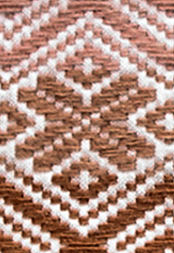Pibiones



The pibiones or grain weaving technique is most commonly found in the central and eastern areas of Sardinia, Italy.[1] This is a particular type of stitched relief, where the pattern is formed from the countless grains incorporated into the cloth during weaving. These are made by twisting the weft yarn around a needle which is arranged in a horizontal position on the loom; after the thread is beat into place, the needle is then pulled away, leaving behind a raised effect (grains).[2]
Pibiones are used to decorate traditional Sardinian linen bedcovers, historically woven by young Sardinian girls to be included in their dowry (corredo).[1]
The pibiones technique was used in antiquity only for the best hand-woven bedcovers sa faona and for household articles such as curtains, fabrics, cushions, and tablecloths.
References
[edit]- ^ a b Needleman, Deborah (13 September 2018). "How Sardinian Weaving Nearly Became a Lost Art". The New York Times. Retrieved 26 June 2019.
- ^ Koza, Kelly Manjula (20 February 2017). "Pibiones". Sardinian Arts. Retrieved 26 June 2019.
